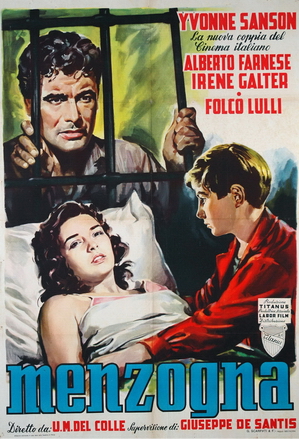A highly accomplished work that breathes new life into the Matarazzo-style melodrama
A sun-drenched Neapolitan setting and the torments of love, entangled in a web of noir
At first glimpse, the idea seems to have been to produce a Matarazzo-style melodrama, borrowing a good part of his habitual cast while at the same time launching the careers of some new protagonists of the genre. On closer inspection, intertwined with the painful twists of passion there are also some flashes of Hollywood noir, a genre banned by the Fascist regime for many years which was now arrogantly beginning to make an appearance on Italian screens. Therefore, the film alternates between the sun-drenched radiance of its Neapolitan exteriors and a sense of corruption that invades the middle-class interiors. While remaining justly proud of and never straying too far from its popular cinematic roots, based on strong storytelling and precise characterisations, Menzogna explores new avenues and overlaps genres. Indeed, some film historians even attribute the film’s direction to Giuseppe De Santis.
A beautiful woman on holiday falls in love with a fisherman, not caring that he already has a girlfriend. One day the woman is joined by a former lover; she refuses his advances and he kills her. The fisherman is charged with murder. However, the truth will eventually come to the surface.
A highly accomplished work that breathes new life into the Matarazzo-style melodrama
A sun-drenched Neapolitan setting and the torments of love, entangled in a web of noir
At first glimpse, the idea seems to have been to produce a Matarazzo-style melodrama, borrowing a good part of his habitual cast while at the same time launching the careers of some new protagonists of the genre. On closer inspection, intertwined with the painful twists of passion there are also some flashes of Hollywood noir, a genre banned by the Fascist regime for many years which was now arrogantly beginning to make an appearance on Italian screens. Therefore, the film alternates between the sun-drenched radiance of its Neapolitan exteriors and a sense of corruption that invades the middle-class interiors. While remaining justly proud of and never straying too far from its popular cinematic roots, based on strong storytelling and precise characterisations, Menzogna explores new avenues and overlaps genres. Indeed, some film historians even attribute the film’s direction to Giuseppe De Santis.
A beautiful woman on holiday falls in love with a fisherman, not caring that he already has a girlfriend. One day the woman is joined by a former lover; she refuses his advances and he kills her. The fisherman is charged with murder. However, the truth will eventually come to the surface.
